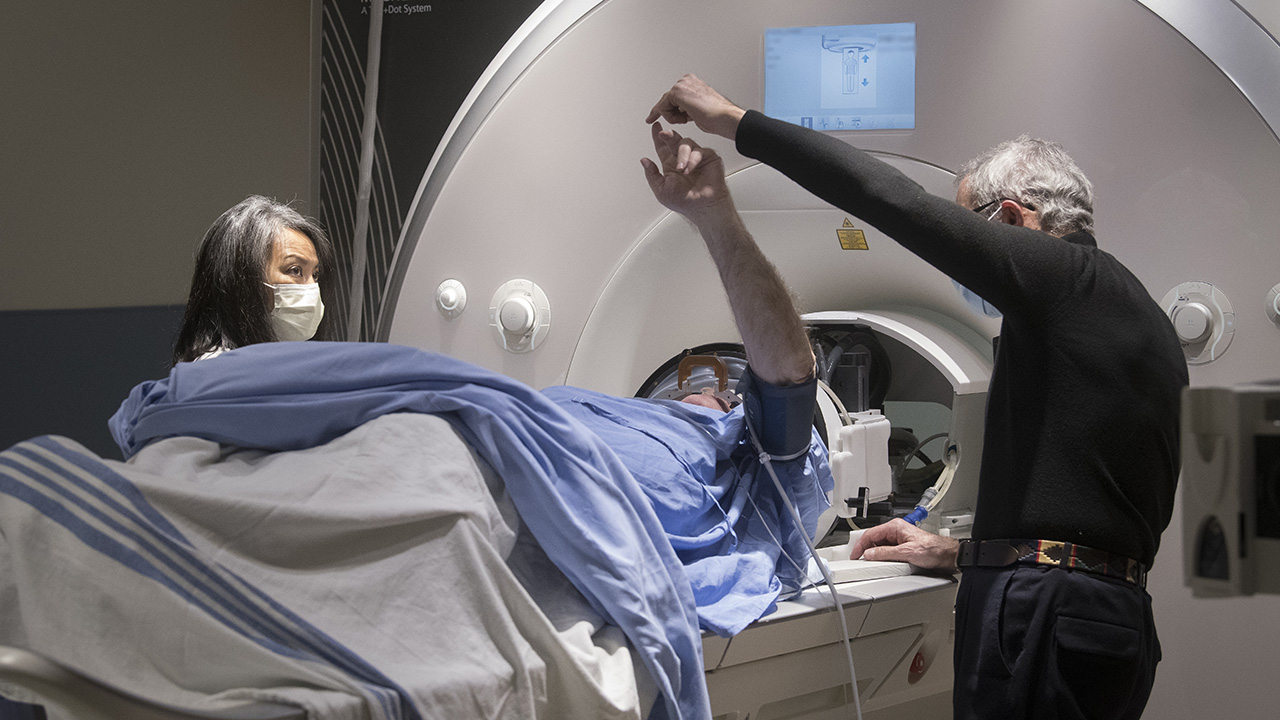New clinical trial at Sunnybrook for bilateral essential tremor treatment with focused ultrasound
Sunnybrook researchers are paving the way for broader applications of the use of focused ultrasound to address essential tremor, a common and debilitating movement disorder that leads to shaking in the body.
Researchers have now launched a new clinical trial at Sunnybrook using MRI-guided focused ultrasound investigating the safety of this treatment for both hands in essential tremor.
In 2012, Sunnybrook brain scientists pioneered the focused ultrasound procedure for essential tremor. Health Canada approved focused ultrasound for unilateral (one-sided) treatment of essential tremor in 2016.
Essential tremor affects four percent of adults over the age of 60 years old, and is a common movement disorder that causes uncontrollable tremors primarily in a patient’s hands and arms. The disorder severely impacts activities of daily living, such as writing, eating and drinking. Some patients experience tremors in both hands, which is known as bilateral tremor.
Focused ultrasound technology uses ultrasound waves under MRI guidance to precisely locate an area in the brain to lesion the cells that are responsible for the tremor, without the need for surgical incisions.
In this clinical trial, patients with severe essential tremor who have previously and successfully been treated with focused ultrasound to address tremor in one hand will receive a second focused ultrasound procedure targeting the other side of the body.
“We know very well the safety of doing one side because we have experience with 200 patients. We’re looking at the safety of doing both sides and to better understand the effects of a second treatment on essential tremor,” says Dr. Michael Schwartz, Sunnybrook neurosurgeon and the study’s co-principal investigator. Dr. Schwartz also lead the world-first focused ultrasound trial for essential tremor at Sunnybrook in 2012.
“MRI-guided focused ultrasound makes it possible to target areas deep in the brain non-invasively,” says Dr. Agessandro Abrahao, co-principal investigator in the study, neurologist, and focused ultrasound investigator with the Harquail Centre for Neuromodulation at Sunnybrook. “This innovative technology is revolutionizing the future of medicine and the treatment of essential tremor and other brain disorders.”
The treatment of essential tremor with focused ultrasound is effective in the majority of patients. Approximately half will have complete or near complete relief, and about 40% will experience some degree of improvement. Results will be unique to every patient.
In this latest study, focused ultrasound is being used to target the thalamus, a small structure in the centre of the brain that sends motor and sensory signals to other parts of the brain. It is the same structure targeted in the patient’s first focused ultrasound treatment for essential tremor. The second focused ultrasound treatment will focus on the thalamus on the side of the brain not yet treated with focused ultrasound to potentially help improve tremor symptoms on the opposite side of the body.
Aidan Bolger has struggled with bilateral essential tremor for many years. “I couldn’t write my name, I could not pick up a knife or fork. It got to a point where my quality of life was virtually nonexistent,” he explains.
In 2019, Aidan received the focused ultrasound treatment for his right hand. It was successful.
One year later, he has returned to participate in this latest clinical trial for his left hand.
After the procedure, Aidan held out his left hand happily noticing it was steadier than before the procedure.
“I’m like the Rock of Gibraltar!” he exclaimed.
Aidan emphasized the importance of continued research to help other patients. “There are so many individuals affected by essential tremor. I feel like I’m the luckiest guy in the world. My luck began with Dr. Schwartz and my string of luck has continued.”
“Focused ultrasound as direct-to–brain intervention which doesn’t require the need for cutting or use of scalpels, is leading the way in precision medicine and will continue to help provide personalized care and treatment for patients in the future,” says Dr. Nir Lipsman neurosurgeon and director of the Harquail Centre for Neuromodulation.
Eligible research participants must be at least 18 years of age, a Canadian resident, have a confirmed diagnosis of essential tremor and have had at least one year pass since their first focused ultrasound procedure. The clinical trial will involve approximately 12 patients.
Patients interested in participating in this research study can contact the Harquail Centre for Neuromodulation at Sunnybrook:
- Email: harquailcentre@sunnybrook.ca Note: Please use subject line: FUS Bilateral Essential Tremor Study
- Phone: 416-480-6100 ext. 63773 (please leave your contact information)
A key driver of Sunnybrook’s research in focused ultrasound is philanthropic investment. This study is funded by the Harquail Centre for Neuromodulation at Sunnybrook.
Media contact:
Jennifer Palisoc
Communications Advisor
Jennifer.palisoc@sunnybrook.ca
Read more:











